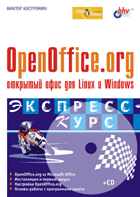Библиотека сайта rus-linux.net
1.6. Linux Compatibility Check
1.6.2. Check Methods in General
If you can't find the necessary information through the above mentioned sources, you are on your own. Luckily, Linux provides many means to help. For details see the section Part V in Linux on the Road Hardware In Detail below. In general you may use:
First of all the kernel itself. Look up what kind of hardware is detected by the kernel. You get this information during boot time or by dmesg or by looking into
/var/log/messages. For the very first boot messages check/var/log/boot.If your kernel supports the
/procfile system you may get detailed information about PCI devices by cat /proc/pci Please read the kernel documentationpci.txt. You may get further information about unknown PCI devices at the Linux PCI ID Repository, the home of the pci.ids file. From 2.1.82 kernels on you may use the lspci command from the pci-utils package.To retrieve information about Plug-and-Play (PNP) devices use isapnp-tools .
Use scsi_info by David Hinds for SCSI devices or scsiinfo.
If you don't want to install a complete Linux you may retrieve this information by using a micro Linux ( see Appendix A Appendix A). The package muLinux provides even a small systest program and TomsRtBt comes with memtest. To use memtest you have to copy it on a floppy dd if=/usr/lib/memtest of=/dev/fd0 and to reboot from this floppy.
If your laptop came with Windows, you may determine a lot of hardware settings from the installation. Boot into DOS or Windows to get the information you need.
Using Windows9x/NT to get hardware settings, basically boot Windows, then Start -> Settings -> Control Panel -> System -> Device Manager and write down everything, or make a hardcopy from the display using the <PRINT> key, plus keep a log of settings, hardware, memory, etc.
Using MS-DOS and Windows3.1x you can use the command msd, which is an akronym for MicroSoft Diagnostics. Or you might try one of the numerous DOS shareware utilities: CHECK-IT, DR.HARD and others.
Sometimes it's difficult to know what manufacturer has built the machine or parts of it actually. The FCC "Federal Communications Commission On-line Equipment Authorization Database may be used, if you are having problems identifying the manufacturer of a laptop or notebook computer (or other electronic device,) this site lets you search the FCC database based on the FCC ID number you can usually find on the equipment if it was marketed in the United States of America."
Many laptops are no more compatible with Windows than Linux. David Hinds, author of the PCMCIA drivers, points out that Toshiba notebooks use a proprietary Toshiba PCMCIA bridge chip that exhibits the same bugs under Windows as under Linux. IBM™ Thinkpads have serious BIOS problems that affect delivery of events to the power management daemon apmd. These bugs also affect MS-Windows, and are listed in IBM™'s documentation as considerations.
Some incompatibilities are temporary, for instance laptops that have Intel's USB chip will probably get full USB support, eventually.






